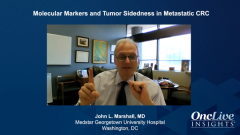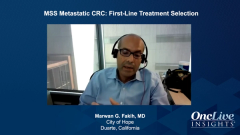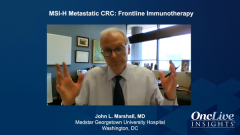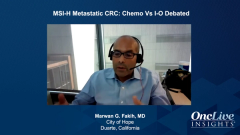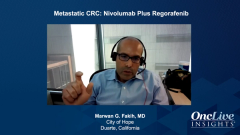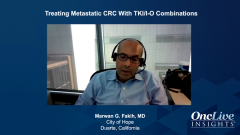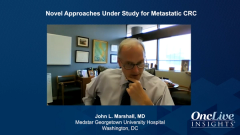
Treating Metastatic CRC With TKI/I-O Combinations
The rationale for continuing to study the combination of immunotherapies with novel tyrosine kinase inhibitors in metastatic colorectal cancer.
Episodes in this series

John L. Marshall, MD: You all can teach me something. I don't really understand this combination mechanism and why a PD-1/PD-L1 inhibitor would be better with these TKI [tyrosine kinase inhibitor] drugs. I know we see it in other diseases, but that's where both drugs have independent activity and are somehow synergistic.
Is this a neoantigen argument? Is this a tumor microenvironment access argument? Was there a quiet PD-1 expression there that we didn't know about? How do you put this together with what you know about the biology of colorectal cancer and the mechanisms of action of these drugs?
Joleen M. Hubbard, MD: That's a really good question. Whenever we try to determine what the exact mechanism of action of these multi kinase inhibitors is, there is some thought about the role of enhancing the immune system. But that really hasn't been proven, or we don't know exactly how that happens. Marwan, do you have any more insight on that?
Marwan G. Fakih, MD: No, I don't think we have an answer. I do think it has to do with the tumor microenvironment somehow, though. I have seen the differences in responses between lung metastasis, especially, and liver metastasis, which is also big. I can tell you that the tumor microenvironment in the lungs is, by itself, different than the liver. To start with, there's a difference in T-cell infiltration. There are differences in antigen-presenting cells. Our group is looking at these things carefully. In the REGONIVO trial [NCT04879368], we do see some correlations. And between CD8 infiltration and positive enzyme B expression, response suggests that may be the case. Apparently, those are increased with the combination with responders as well. So somehow, regorafenib or other TKIs are working hand in hand, but in the right environment. And right now, that right environment does not appear to be as prevalent in liver metastases and lung metastatic disease as shown on both studies with REGONIVO so far. There is also another study that looked at the combination of a TKI and a PD-1 inhibitor out of Asia that has also shown the liver to be associated with a lower response. So I do think the tumor microenvironment matters, but I don't understand the mechanism as to why it’s happening more in the lung and liver yet.
John L. Marshall, MD: If you remember the line from The Graduate, the famous line that says, “Plastics. There is a great future in plastics.” I tell you, from one old guy to you smart people, it's going to be the microbiome. You just watch. We're going to figure out how we're interfacing with our bacterial friends, and we’re going to understand how they're an important part of our health.
Transcript Edited for Clarity


